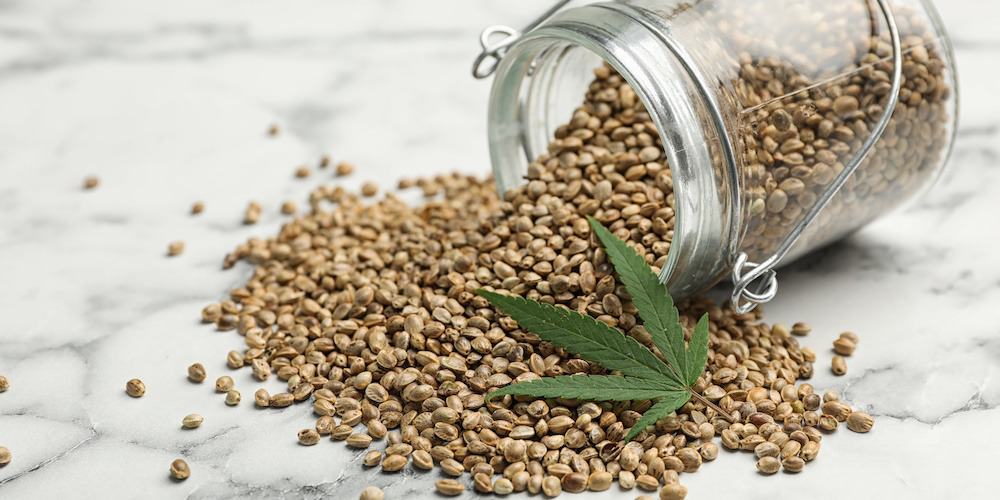HEMP BENEFITS
✓ Source of protein
✓ Protects the cardiovascular system
✓ Reduces cholesterol levels
✓ Antioxidant
✓ Relieves skin problems
What is hemp?
The scientific name for hemp is Cannabis sativa. Originating from Central Asia, it is a plant in the Cannabaceae family, like hops and recreational cannabis. However, it should not be confused with the latter, which is a psychoactive plant used for recreational or therapeutic purposes.
Indeed, hemp has a very low tetrahydrocannabinol (THC) content, the psychoactive substance in cannabis. It contains less than 0.2% THC. Therefore, the plant is allowed to be cultivated, marketed, and consumed in accordance with French regulations.
Hemp is an annual plant that can reach up to 5 meters in height depending on the variety. It has thin leaves and a deep taproot, complemented by many secondary roots.
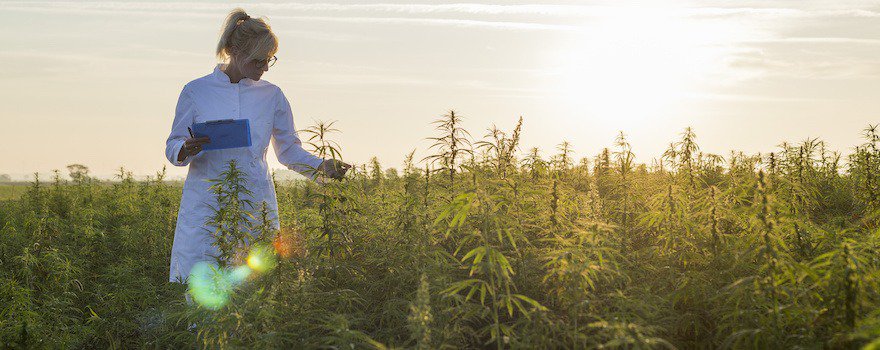
In late July to early August, hemp offers a beautiful bloom that attracts bees and pollinating insects. While the male plants wilt and die, the female Cannabis sativa plants produce a large number of seeds called hemp seeds.
All parts of the plant are useful. The rigid part of the stem, the hurds, is used as natural insulation and for making plasters and concretes. The flowers and leaves are used to obtain essential oil recognized in aromatherapy.
Hemp fiber, in turn, has long been used in the textile industry for clothing manufacturing. It was even used by the Scandinavian Vikings to make their garments.
From a medicinal perspective, it is mainly the hemp seeds that are of interest. An excellent source of essential fatty acids (omega-3-6-9), they are also rich in proteins, fibers, vitamins, minerals, and trace elements.
They can be consumed raw, in powder, in drinks, or pressed to obtain oil.
Hemp seeds possess numerous nutritional advantages and interesting health properties. Today they are offered as dietary supplements (capsules, powders, capsules).
In addition to being an excellent source of protein, they protect the cardiovascular system, reduce cholesterol levels, have antioxidant activity, and relieve skin problems.
Nutritional Composition
- 20 amino acids, including the 8 essential ones
- Vitamins: provitamin A, B (B1, B2, B3, B6, B9), C, E
- Minerals and trace elements: calcium, sodium, iron, zinc, manganese, magnesium, phosphorus, copper
- Essential fatty acids: omega-3-6-9
- Polyphenols
- Proteins
- Carbohydrates
- Fibers
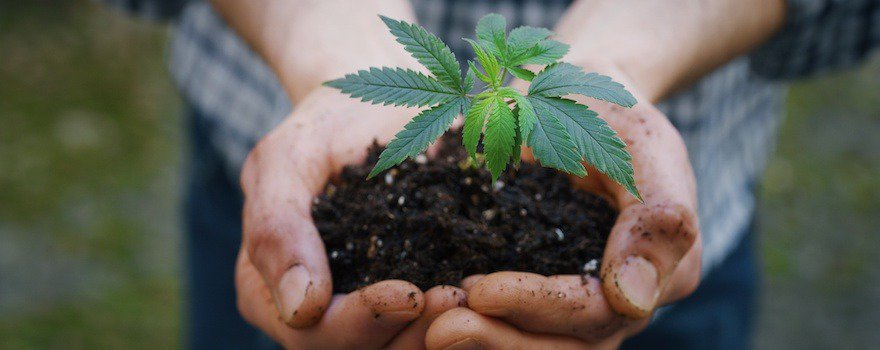
Benefits
1. Source of protein
Like chia seeds, hemp seeds are highly nutritious. They notably contain a large amount of fiber (4 g per 100 g) and omega-3-6-9 (15 g per 100 g).
But hemp seeds stand out particularly for their high protein content: 26 g per 100 g! Thus, they are among the 20 best plant proteins alongside spirulina and moringa. Hemp seeds are therefore ideal for replacing animal proteins within a flexitarian, vegetarian, or vegan diet.
Half of its proteins are complete proteins, meaning they contain all the essential amino acids needed for the body’s functioning. Hemp seeds are particularly rich in cystine, methionine, and arginine.
There are also 2 types of proteins: edestin, also present in legume seeds, and albumin. Edestin is a highly digestible protein that participates in many biological functions: antibody production, hormone synthesis… Albumin, on the other hand, is a soluble protein produced by the liver. It ensures the transport of important elements in the blood and stabilizes the blood volume, that is, the total volume of circulating blood in the body.
This review from the University of Kuopio (Finland) examined the nutritional composition of hemp seeds.
2. Protects the cardiovascular system
In various scientific studies, hemp seeds have been shown to be beneficial for cardiovascular health.
Hemp seeds are particularly rich in arginine, an essential amino acid. By activating the production of nitric oxide, it improves blood circulation, prevents the formation of clots, and dilates blood vessels. Therefore, hemp seeds are particularly useful for preventing arteriosclerosis (affecting the wall of the heart’s arteries), coronary heart diseases, thrombosis, etc.
Moreover, arginine improves high blood pressure, one of the main risk factors for cardiovascular diseases. It also positively influences inflammatory markers, such as C-reactive protein (CRP), whose elevated levels are associated with an increased risk of heart disease.
Hemp seeds also contain significant amounts of omega-3 (linolenic acid) and omega-6 (linoleic acid). These essential fatty acids protect the heart, prevent cardiovascular diseases, help control blood pressure and triglycerides, while improving vascular function.
Lastly, hemp seeds are rich in vitamins, minerals, and trace elements good for the heart such as B vitamins (B1, B3, B6, B9), vitamin C, vitamin E, calcium, and magnesium.
This study by the University of Manitoba and Institute of Cardiovascular Sciences (Canada), conducted on rats, shows the beneficial effects of hemp seeds on cardiovascular health.
3. Reduces cholesterol levels
Hemp seeds are superfoods that are very beneficial in cases of hypercholesterolemia. They contain many nutrients that contribute to reducing bad cholesterol (LDL cholesterol) while stabilizing or even increasing good cholesterol (HDL cholesterol) levels.
On one hand, soluble fibers trap fats in the blood, like cholesterol and triglycerides, and facilitate their elimination. On the other hand, the seeds present a balanced ratio of omega-3 and 6, which are valuable for eliminating bad cholesterol.
This study from Konkuk University (South Korea), conducted on flies, demonstrates how hemp seed intake reduces cholesterol levels and inhibits its absorption.
4. Antioxidant
Hemp seeds have a antioxidant action. Thus, they effectively combat free radicals and their damage to cells and tissues.
Some varieties of hemp, such as the Finola cultivar, are particularly rich in polyphenols and quercetin, antioxidant compounds. They inhibit the oxidation of beta-carotene by free radicals and the activity of the peroxyl radical (RHO 2).
The antioxidant action of hemp seeds is complemented by vitamin C (500 mg per 100 g), which fights the formation of free radicals, as well as provitamin A and vitamin E.
This study from the University of Messina (Italy), conducted directly in the laboratory, highlighted the antioxidant compounds in hemp seed oil from the Finola variety.
5. Relieves skin problems
Its seeds are also valuable for improving skin issues like atopic dermatitis, psoriasis, or eczema.
Due to its high content of essential fatty acids, it reduces dry skin and itching. Some of its vitamins also contribute to the beauty and health of the skin. Provitamin A (beta-carotene) promotes cell renewal, vitamin C contributes to collagen production, and vitamin E slows down skin aging.
Finally, hemp seeds contain zinc (9.9 mg per 100 g), which is very useful for skin problems like acne.
This study from the University of Kuopio (Finland), conducted on patients with atopic dermatitis, shows how hemp oil improved their symptoms.

How to consume hemp ?
Whole or hulled seeds
It is possible to find hemp seeds whole or hulled, meaning without their shell. Whole seeds have the advantage of being richer in fiber since a large portion of the hemp’s soluble fiber is found in the shell. Hulled seeds, on the other hand, contain more protein and omega-3-6-9.
Regardless of your choice, hemp seeds can be eaten as they are, roasted, as a snack, sprinkled in salads, yogurts… They can also be ground to obtain a delicious gluten-free flour.
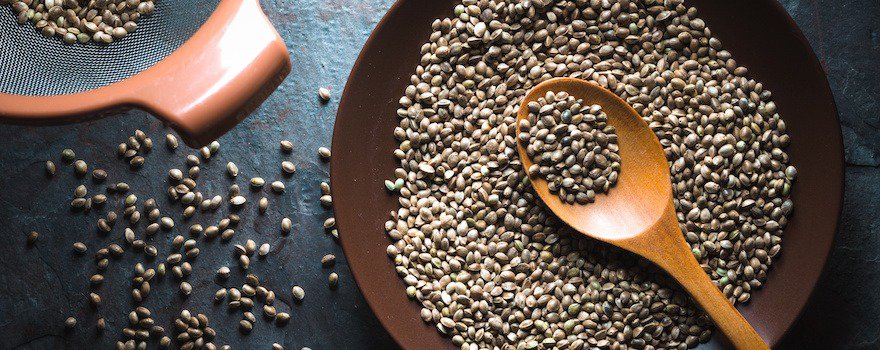
In capsules
Hemp is also offered in the form of capsules or softgels containing Cannabis sativa seed oil. This format is interesting because it is rich in active compounds and easy to consume. Hemp capsules also have the advantage of being tasteless.
To fully benefit from the advantages of hemp, choose capsules that are sufficiently rich in oil (500 mg/capsule minimum).
As an oil
After harvesting, hemp seeds are pressed to extract all the oil. This results in an interesting oil to use in cooking for its nutritional qualities and its light nutty flavor. Hemp oil is more of a seasoning oil rather than a cooking oil.
You can also use it in your beauty routine to improve skin problems or care for dull or damaged hair. Preferably choose a virgin oil, 100% pure, natural, and cold-pressed.

In powder form
Hemp seeds can also be ground into powder. Hemp seed powder mixes easily with plant-based milks, smoothies, or juices. You can also add it to salads, soups, yogurts, bread, desserts, and pastries.
This powder should not be confused with hemp protein powder. When hemp seeds are crushed to extract the oil, the powdery residues are collected and then ground to obtain a fine powder: hemp protein. It is valuable for its high protein content and excellent digestibility.
Hemp milk
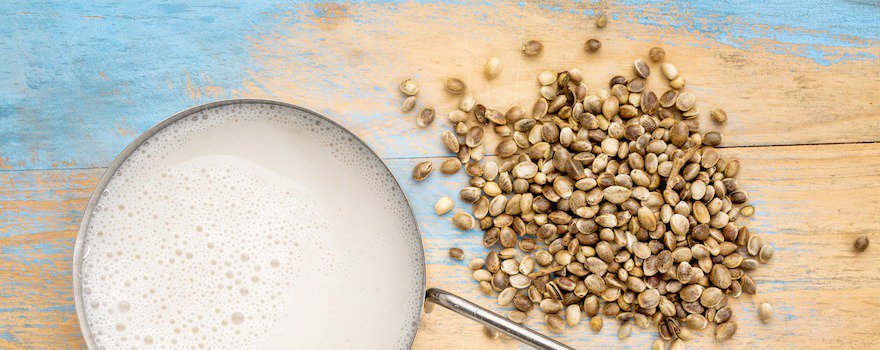
Hemp milk is a plant-based drink composed of ground hemp seeds and water. It is ideal for people with lactose intolerance. Moreover, it is gluten-free and very digestible.
You can make your own hemp milk at home. To do this, soak 150 g of hemp seeds in 1 L of water for 2 hours. Then blend the mixture until smooth. Strain everything, then sweeten the resulting drink with honey or a pinch of lucuma powder (Pouteria lucuma).
Hemp and CBD
Today, whether in nutraceuticals or cosmetics, we see CBD (cannabidiol)-based products flourishing. This molecule present in hemp and cannabis is thought to have anti-stress potential (but is non-psychotropic like THC).
While the legislation surrounding these products is more flexible in the United States, their use is strictly regulated in France: only certain varieties of hemp can be used, the use of leaves and flowers is prohibited, and any therapeutic claims are banned.

Hemp and medicinal plants
To improve cardiovascular health, hemp pairs well with açai (Euterpe oleracea) which protects the heart thanks to its anti-cholesterol properties.
To optimize digestion, it might be interesting to combine hemp seeds, already rich in fiber, with chia seeds or psyllium (Plantago ovata).
Sustainable consumption: prioritize organic, fair trade, and local hemp
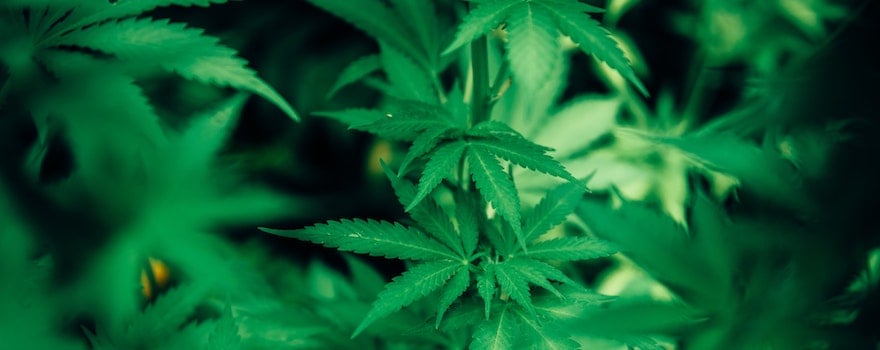
✓ Today, it is mainly cultivated in China, France, Korea, Spain, and Chile. Faced with growing demand, many French producers have started growing hemp. The industry’s stakeholders are grouped within FNPC (National Federation of Hemp Producers). It is the largest European industry!
✓ To support local production, we advise choosing hemp grown in France. Prioritize hemp from organic farming, non-GMO and grown without chemical fertilizers, pesticides, and insecticides. The fair trade industry also supports small producers and their work.
Dosage
⚖️ It is recommended not to consume more than 3 tablespoons of hemp seeds per day (which is between 20 and 30 g). We advise starting with small doses and gradually increasing your consumption based on the effects felt.
⌛️ Intakes should preferably be in the morning, on an empty stomach.
🥄 In seeds: 1 to 3 tablespoons per day.
💊 In capsules: up to 3 per day for capsules of 475 mg.
🥃 In oil: 1 tablespoon per day.
🥄 In powder: 1 teaspoon per day.
Contraindications and side effects
The consumption of hemp presents certain contraindications:
- As a precaution, young children, pregnant or breastfeeding women should avoid taking hemp.
- People allergic to nuts should also avoid consuming it.
- Due to their action on blood coagulation, hemp seeds are not recommended for people taking anticoagulant medications.
Excessive consumption of hemp can lead to the following side effects:
- Digestive disorders
- Diarrhea
- Allergies
If you experience any side effects, stop your consumption and consult a doctor.
History, culture, and market
Hemp has been used for several centuries in the manufacture of ship ropes, as well as in textiles and paper. The first Bible printed by Gutenberg in 1456 was on hemp-based paper.
Today, it is discovered that this plant is also useful for biodiversity. Indeed, according to this study, hemp flowers play an important role in the conservation of bees by providing them with a sustainable food source.
Many species of bees are attracted to this nectar. Like spirulina, considered as a nutritional substitute for pollen, it could be a possible response to their decline.
Hemp also attracts other insects, like butterflies, and also birds who find an excellent source of protein in it. This is why its seeds are often incorporated into bird feed mixtures.
From the textile industry to food, paper, biodegradable plastics, biofuels, and biodiversity, hemp has exceptional potential, especially since its cultivation requires little water, and the plant is very resilient.
Report by Julia Perez and Charlotte Jean
Sources and scientific studies
J. C. Callaway, 2004. Hempseed as a nutritional resource: An overview.
G Skoglund, M Nockert, B Holst, 2013. Viking and Early Middle Ages Northern Scandinavian Textiles Proven to Be Made With Hemp.
Delfin Rodriguez-Leyva, and Grant N Pierce, 2010. The cardiac and haemostatic effects of dietary hempseed.
Min Jung Lee, Seung Hwan Park, Ju Hua Han, Yoon Ki Hong, Soojin Hwang, Soojin Lee, Darae Kim, Seung Yeop Han, Eun Soo Kim, and Kyoung Sang Cho1, 2011. The Effects of Hempseed Meal Intake and Linoleic Acid on Drosophila Models of Neurodegenerative Diseases and Hypercholesterolemia.
Antonella Smeriglio, Enza M Galati, Maria T Monforte, Francesco Lanuzza, Valeria D’Angelo, Clara Circosta, 2016. Polyphenolic Compounds and Antioxidant Activity of Cold-Pressed Seed Oil From Finola Cultivar of Cannabis Sativa L.
James Callaway, Ursula Schwab, Ilkka Harvima, Pirjo Halonen, Otto Mykkänen, Pekka Hyvönen, Tomi Järvinen, 2005. Efficacy of Dietary Hempseed Oil in Patients With Atopic Dermatitis.
C.O’ Brien, H.S.Arathi, 2019. Bee diversity and abundance on flowers of industrial hemp (Cannabis sativa L.).


